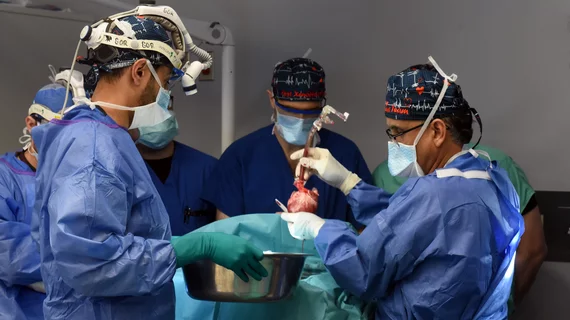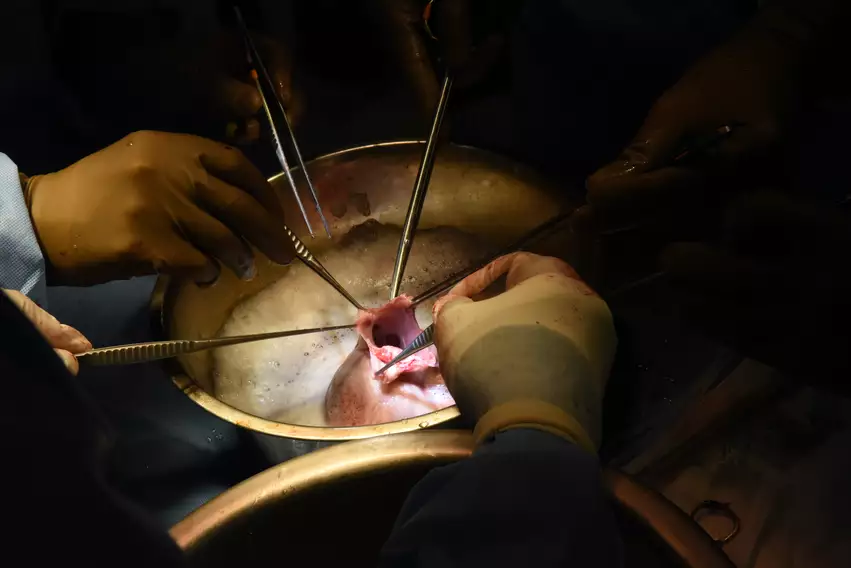Surgeons make history again, transplant pig heart into human patient for second time ever
Surgeons with the University of Maryland Medical Center (UMMC) in Baltimore have transplanted a genetically modified pig heart into a 58-year-old patient facing near-certain death from heart failure.
This is only the second time such a transplant has ever occurred—the team at UMMC performed the first one as well.
Bartley P. Griffith, MD, a professor of surgery and clinical director of the cardiac xenotransplantation program at the University of Maryland School of Medicine (UMSOM), and Muhammad M. Mohiuddin, MD, scientific director of the cardiac xenotransplantation program at UMSOM, performed the historic procedure on Sept. 20.
The patient, Lawrence Faucette, was admitted to UMMC on Sept. 14 with end-stage cardiovascular disease. His symptoms were related to complications from both heart failure and peripheral vascular disease. The U.S. Food and Drug Administration ruled Faucette had no other options and approved the procedure through its “compassionate use” pathway.
“My only real hope left is to go with the pig heart, the xenotransplant,” Faucette said when interviewed before the procedure, according to a new UMMC statement. “Dr. Griffith, Dr. Mohiuddin and their entire staff have been incredible, but nobody knows from this point forward. At least now I have hope, and I have a chance."
Faucette is currently at UMMC recovering. His heart is functioning without assistance from any other devices, according to the hospital.
“We are once again offering a dying patient a shot at a longer life, and we are incredibly grateful to Mr. Faucette for his bravery and willingness to help advance our knowledge of this field,” said Griffith said in the same UMMC statement. “We are hopeful that he will get home soon to enjoy more time with his wife and the rest of his loving family.”
“This transplant is another remarkable achievement for medicine and humanity that would not have been possible without the close relationship between UMMC and our UMSOM partners,” added Bert W. O'Malley, MD, president and CEO of the UMMC.
Looking back at the first patient to receive a genetically modified pig heart
The world’s very first pig heart transplant was completed by UMMC surgeons in January 2022. That patient, 57-year-old David Bennett, died from heart failure two months later. Bennett’s poor health leading up to the procedure has been cited as the primary cause of his death, though evidence also suggests the transplanted heart was infected with a virus.
“We have gained invaluable insights learning that the genetically modified pig heart can function well within the human body while the immune system is adequately suppressed,” Mohiuddin said at the time. “We remain optimistic and plan on continuing our work in future clinical trials.”
New therapy designed to prevent patient's body from rejecting the pig heart
One key difference between this most recent procedure and the first time a human patient received a pig heart transplant is that Faucette is being treated with tegoprubart, a new-look therapy developed by California-based Eledon Pharmaceuticals.
Tegoprubart is an investigational anti-CD40 antibody “designed to suppress the immune system and prevent the body from rejecting the implanted organ,” according to separate statement from Eledon.
“As the field of organ transplantation continues to make important scientific advances, Eledon is dedicated to delivering a novel immunosuppressive regimen with the potential to protect and prevent rejection of transplanted organs, and we are honored to play a role in this historic development,” David-Alexandre C. Gros, MD, the company’s CEO, said in the statement.


